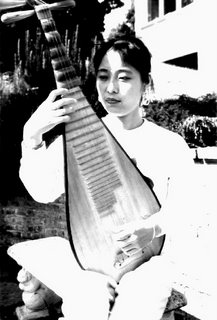 Last week, the Russian violist/violinist Yuri Bashmet and his Moscow Soloists presented a classical music program at the Library of Congress that not only attempted to bring “East” and “West” together – but actually succeeded in doing so. It began with Toru Takemitsu’s Nostalghia (written in memory of Andrei Tarkovsky and not afraid of hinting at a film-music-like melodic style) where Bashmet’s gorgeous violin (!) sound came to bear in the romantic, oceanic ebbing and swelling of the work.
Last week, the Russian violist/violinist Yuri Bashmet and his Moscow Soloists presented a classical music program at the Library of Congress that not only attempted to bring “East” and “West” together – but actually succeeded in doing so. It began with Toru Takemitsu’s Nostalghia (written in memory of Andrei Tarkovsky and not afraid of hinting at a film-music-like melodic style) where Bashmet’s gorgeous violin (!) sound came to bear in the romantic, oceanic ebbing and swelling of the work.When I saw Tan Dun’s First Emperor I bemoaned that it was hardly as successful (or novel) a composition as his “Ghost Opera” (for string quartet, pipa, and water bowl, stones, paper, and metal) which I have loved ever since I heard the Kronos String Quartet’s recording on Nonesuch almost 10 years ago. With the stunning pipa player Wu Man, the Moscow Soloists (now conducted, awkwardly, by Mr. Bashmet) presented the souped-up version of it, now titled Concerto for Pipa and String Orchestra. If it does not have the variety of the original (no stones, no water-bowl), it certainly is a more practical piece in this form – and its essential appeal is hardly diminished by the thicker textures of the strings. The appeal of the concerto (replete with shouting and huffing from the players) extended to every listener in the Coolidge Auditorium, not the least due to Ms. Wu Man’s impeccable and engaged performance, who then proceeded to give a traditional virtuoso encore which received enthusiastic standing ovations.
 Unsurprisingly, Yuri Bashmet’s playing (which has not suffered, unlike his once roguish-wild good looks: now with thin, matte hair he resembles a sixty-year old Mad Max, gray of age and red of alcohol) on the viola is every bit as good as on the violin – if perhaps a touch more hesitant-sounding in Hikaru Hayashi’s Concerto “Elegia” for Viola and Strings. By far the most western sounding of the works on the program it made for a wonderful concertino for strings that any violist should like to have in their repertoire. Modern but lyrical (as its name would suggest, anyway), it requires many precise, squealing high harmonic notes, and endless cadenza, and compellingly primitive sounds.
Unsurprisingly, Yuri Bashmet’s playing (which has not suffered, unlike his once roguish-wild good looks: now with thin, matte hair he resembles a sixty-year old Mad Max, gray of age and red of alcohol) on the viola is every bit as good as on the violin – if perhaps a touch more hesitant-sounding in Hikaru Hayashi’s Concerto “Elegia” for Viola and Strings. By far the most western sounding of the works on the program it made for a wonderful concertino for strings that any violist should like to have in their repertoire. Modern but lyrical (as its name would suggest, anyway), it requires many precise, squealing high harmonic notes, and endless cadenza, and compellingly primitive sounds.Stephen Brookes, Bashmet: From Russia With a Pipa (Washington Post, January 26) |


No comments:
Post a Comment